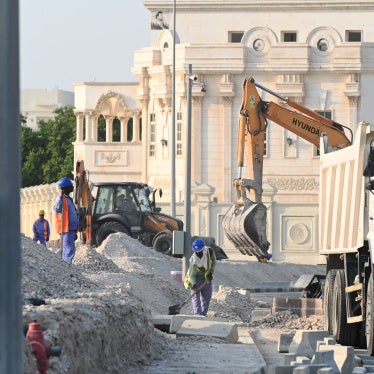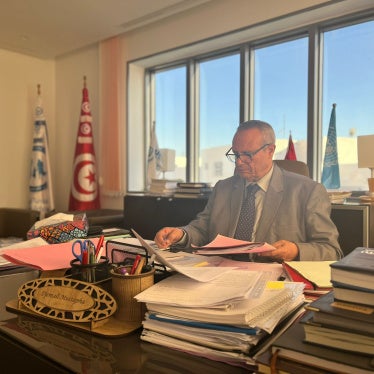(Beirut) – Jordanian authorities have forcibly deported vulnerable Syrian refugees back to Syria in violation of Jordan’s international obligations. Those deported include wounded men and unaccompanied children.
Refugee deportations violate the international law principle of nonrefoulement, which forbids governments from returning people to places where their lives or freedom would be threatened. Those deported include a group of 12 Syrian refugees who had been receiving treatment at a rehabilitation center in northern Jordan as well as four refugees, three of them children, whom Jordanian border police intercepted near the Syrian border.
“Jordan is carrying a heavy refugee burden, but it should not be in the business of sending any refugees back to a conflict zone where their lives are threatened, much less children and wounded men who can’t even walk,” said Nadim Houry, deputy Middle East and North Africa director. “Such deportations create an environment of fear that affects all refugees.”
A Syrian refugee, Mohammed (not his real name), told Human Rights Watch that a Jordanian border patrol fired on two of his sons, ages 14 and 17, two of their cousins, both under 18,and a 20-year-old Syrian acquaintance as they rode motorcycles near the Syrian border at 12:30 p.m. on November 14, 2014. All are refugees registered with UNHCR, the UN refugee agency.
The 17-year-old was wounded in the right leg and is being treated at a hospital inside Jordan, his father said. The other four were deported. The children’s parents and siblings remain in Jordan.
Mohammed, who is living in the village of al-Turra, in Mafraq governorate 3 kilometers south of the Syrian border, said officials told him the four were deported for allegedly attempting to enter Syria illegally. But he disputes this, saying his sons told him that they were merely riding motorcycles in an area near the border and that they tried to flee when the border patrol spotted them and opened fire.
Jordanian officials should investigate the shooting incident, and in case of wrongdoing, penalize officers who used excessive force, Human Rights Watch said.
The five escaped the border patrol on November 14, but Jordanian police discovered their identities after Mohammed’s 17-year-old son entered the hospital for treatment. Police summoned the other four later that day, he said, and the families turned them over to police at 3 a.m. on November 15. Police held them in a police station until November 18, then moved them to the Raba Sarhan transit center, the Jordanian government’s registration center for Syrian refugee arrivals and departures, to process them for deportation.
Mohammed said that Jordanian security forces dropped his son and nephews at an informal border crossing near the Syrian village Tel Shihab and ordered them across. He said they will return to their hometown of Tafas a few kilometers away and seek shelter with relatives there.
In another incident, on September 16, Jordanian authorities sent back the 12 Syrians, most of whom had refugee certificates, who had been receiving treatment at Dar al-Karama rehabilitation center in the northern city of al-Ramtha. A Syrian refugee, Saeed (not his real name), who knew the deportees, and a humanitarian worker told Human Rights Watch that Jordanian police raided and forcibly closed the center, then took away the men being treated there and deported them.
Saeed said that the group included six paralyzed men and six wounded people – including two children – who require regular care. All went to private homes in the Syrian city of Daraa city on September 16, but these homes do not have the capacity or resources to provide them with adequate care, he said. Al Jazeera conducted a videotaped interview with one of the wounded deportees in Daraa on September 20.
Human Rights Watch spoke by phone with one of the deported refugees, a 17-year-old who requires further medical treatment for an eye injury. He told Human Rights Watch that authorities did not tell the 12 the reason for their deportation or allow them to contact UNHCR. He is staying with relatives but hopes to re-enter Jordan to reunite with his mother and other family members.
A Jordanian government spokesperson told Human Rights Watch that the authorities closed the rehabilitation center because it was not licensed by the Health Ministry and the Syrian medical personnel operating the hospital were not licensed to practice in Jordan. The spokesperson denied that Jordan deported the refugees, stating that they had been “relocated in other hospitals to get the proper treatment by practicing doctors,” but the spokesperson did not say where.
Saeed and a Jordanian involved with the rehabilitation center told Human Rights Watch that while the center was not officially licensed by Jordan’s Health Ministry, its operators were in discussions with Jordanian officials regarding the status of the center, which had functioned for nearly two years without any major incidents.
Saeed told Human Rights Watch that the center did not accept undocumented refugees and that all those deported had the security certificates from Jordan’s Public Security Directorate that are given only to registered refugees. The humanitarian worker could not confirm that all of the deported wounded were registered refugees, but did confirm that at least some were properly documented and had the security certificates.
The Daraa governorate has been the site of fierce clashes between the Free Syrian Army, the Islamic Front, Jabhat al-Nusra, Syrian armed forces, and other armed groups for more than three years. Jordan has allowed thousands of war-wounded Syrians to seek treatment inside the country since the beginning of the conflict, coordinating with field hospitals run by Syrian opposition groups to transport urgent cases over the border and into Jordanian medical facilities.
According to an October report by the Syria Needs Analysis Project (SNAP), a nongovernmental monitoring group that provides independent analysis of the humanitarian situation of those affected by the Syrian crisis, “the number of refoulements of Syrian refugees [by Jordan] has increased in September [2014], particularly of those with invalid or outdated documentation or who have gone to Syria and returned back to Jordan.” An August Human Rights Watch report documented Jordan’s discriminatory treatment of Palestinians from Syria, including deportation of 16 Palestinians to Syria since the beginning of 2013.
International humanitarian workers confirmed to Human Rights Watch that in late September, Jordan closed its border to nearly all refugees fleeing Syria. The SNAP report stated that “5,000 Syrians were stranded [in the border] with the [Jordanian Armed Forces] denying humanitarian agencies access to the area.”
Jordan should immediately facilitate the return of all deported refugees who wish to re-enter Jordan, including children who want to reunite with their families, Human Rights Watch said. The authorities should cease deportations and open the borders to Syrian refugees.
While Jordan is not a party to the 1951 Refugee Convention or its 1967 Protocol, Jordan is nevertheless bound by the customary international law principle that that a country may not push back or return a refugee or asylum seeker to a country where there is a risk that the person’s life or freedom would be threatened or where they would face a serious risk of torture or other cruel, inhuman, or degrading treatment.
Deportations of unaccompanied children violate Jordan’s obligations under the Convention on the Rights of the Child, which Jordan ratified in 1991. The convention states that countries “shall take appropriate measures to ensure that a child who is seeking refugee status or who is considered a refugee … shall, whether unaccompanied or accompanied by his or her parents or by any other person, receive appropriate protection and humanitarian assistance.” Under article 9 of the convention, Jordan is obliged to “ensure that a child shall not be separated from his or her parents against their will, except when competent authorities subject to judicial review determine, in accordance with applicable law and procedures, that such separation is necessary for the best interests of the child.”
“As fighting in southern Syria intensifies, now is not the time for Jordan to harden its stance toward refugees who have nowhere else to flee,” Houry said. “Jordan certainly will want to secure its border, but it should not be turning its back on its neighbors.”








